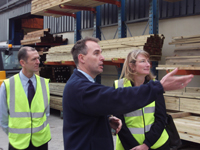

SOUTH DEVON: Dr Sarah Wollaston, the Totnes MP, went to the Kingsbridge branch of Palladium Building Supplies at the invitation of director Keith Olver to hear how merchants are managing, as the industry forecasts construction will continue to decline over the next two years – with no real sign of recovery until 2014.
Palladium sees the return of a thriving repair, maintenance and improvement (RMI) market as a way to revitalise the county's economy.
Mr Olver believes there is demand for work in South Hams which is being held back by economic uncertainty and consumers' unwillingness to spend. Welcoming Sarah Wollaston was branch manager, Nick Cox, who toured the site with her.
Mr Cox explained how the business is investing to showcase energy-saving solutions for trade and DIY customers. Dr Wollaston heard how the merchant helps her constituents to choose a greener way of life. The MP talked to branch staff about sales of insulation in the wake of the last two cold winters - the most severe ones experienced for 30 years.
The combination of freezing cold weather and rising fuel prices – especially for those in rural parts of Devon – means home insulation makes sense financially, as well as for family comfort.
Palladium has a reputation for training its people in product knowledge to give impartial advice to customers at point-of-sale. Two branch staff – Karina Tyszkiewicz and Sylvain Bourdas – have been recognised nationally for their studies. Both were awarded learning distinctions by the Manchester College at the annual BMF Members' Day in each of the last two years.
"I was delighted to visit Palladium here in town and learn of their contribution to the district's economy," said Dr Wollaston. "Nick Cox and his team are to be congratulated on their efforts, despite testing times. I was particularly struck by the quality of advice available to customers and it was a pleasure to meet Sylvain Bourdas, winner of a national award for his product knowledge.
"With an increasing demand for energy, and steadily-rising prices, the urgent carbon challenge is to improve energy conservation. Insulation makes a real difference to saving money on fuel bills and keeping warm for less over the winter.
"Today was useful, not least because I saw, at first hand, the products and materials that local SME trades are buying and fitting every day in South Devon and the challenges that can now be overcome by new materials".
Explaining the Palladium philosophy, Mr Olver added: "Our staff display an appetite to improve their all-round skills by putting knowledge of the products and materials they sell at the forefront of customer service. We support our people to achieve this by in-work training, or open-source learning."
Answering a query from the MP, Mr Olver dispelled the myth that merchants are only for the trade: "Palladium welcomes DIY enthusiasts. We can advise them on the products and materials they require. And if necessary, we will suggest different approaches or solutions to fulfil their ideas."
Dr Wollaston asked Palladium about vehicle operating costs prior to a parliamentary debate on rising road fuel prices. Pressure from MPs responding to the national petition by the Fair Fuel campaign meant the House of Commons spent a half-day debating Fuel Duty and associated driving costs.
Branch manager, Nick Cox, gave the MP an indication of the year-on-year rise in fuel prices faced by smaller independents. In line with other merchants, Palladium calculates the rate of increase as:
* 122% between calendar years 2009 and 2010.
* 154% between calendar years 2010 and 2011.
This is a reliable indicator because most merchants' annual turnover has been (at best) flatlining since the Credit Crunch began in 2008.
On the day of Dr Wollaston's visit, the pump price of diesel in Kingsbridge was £1:49p – typical for a rural constituency. The MP drew on Mr Cox's data when speaking in the Commons' debate a few days after her visit.
She mentioned Palladium Building Supplies by name in her speech to illustrate the knock-on effect of planned Fuel Duty rises on the South Devon building industry.
During her visit the MP had also heard a merchants' view on some of her government's policies:
* VAT: it is perverse to apply a 5% rate on energy consumption – but the full 20% standard rate for energy conservation – the 5% VAT rate should apply to both.
* Changes to the planning system are a sensible, long-term attempt to balance competing demands – merchants' customers do not want to develop projects that prove to be so unpopular, or poorly designed, that they cannot sell or rent them.
* The successful 2010 Boiler Scrappage Scheme ought to be repeated if ministers want to stick to their declared aim of being 'the greenest Government ever'.